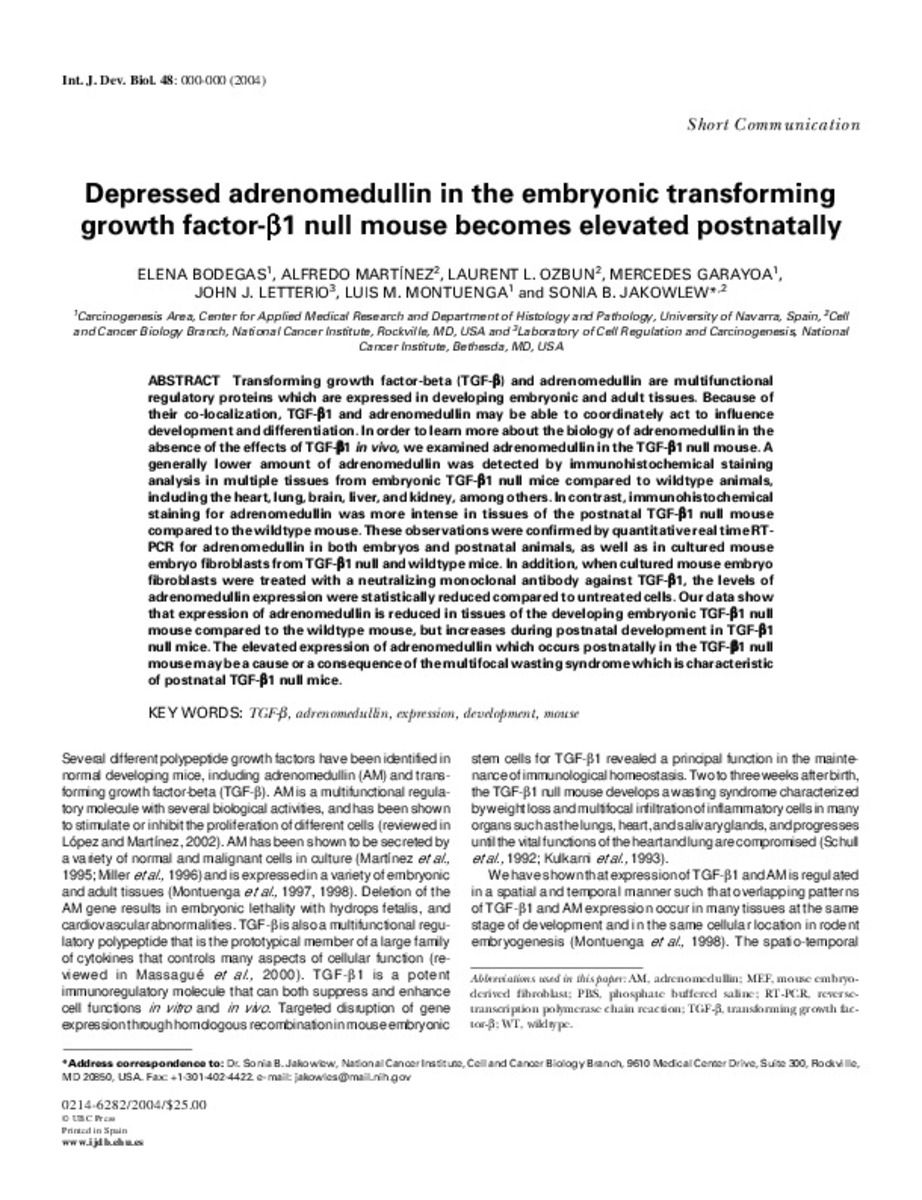Full metadata record
| DC Field | Value | Language |
|---|---|---|
| dc.creator | Bodegas-Frías, E. (Elena) | |
| dc.creator | Martinez, A. (Alfredo) | |
| dc.creator | Ozbun, L.L. (Laurent L.) | |
| dc.creator | Garayoa, M. (Mercedes) | |
| dc.creator | Letterio, J.J. (John J.) | |
| dc.creator | Montuenga-Badia, L.M. (Luis M.) | |
| dc.creator | Jakowlew, S.B. (Sonia B.) | |
| dc.date.accessioned | 2011-08-23T07:48:58Z | - |
| dc.date.available | 2011-08-23T07:48:58Z | - |
| dc.date.issued | 2004 | - |
| dc.identifier.citation | Bodegas E, Martinez A, Ozbun LL, Garayoa M, Letterio JJ, Montuenga LM, et al. Depressed adrenomedullin in the embryonic transforming growth factor-beta1 null mouse becomes elevated postnatally. Int J Dev Biol 2004 Feb;48(1):67-70. | es_ES |
| dc.identifier.issn | 1696-3547 | - |
| dc.identifier.uri | https://hdl.handle.net/10171/18814 | - |
| dc.description.abstract | Transforming growth factor-beta (TGF-beta) and adrenomedullin are multifunctional regulatory proteins which are expressed in developing embryonic and adult tissues. Because of their colocalization, TGF-beta1 and adrenomedullin may be able to coordinately act to influence development and differentiation. In order to learn more about the biology of adrenomedullin in the absence of the effects of TGF-beta1 in vivo, we examined adrenomedullin in the TGF-beta1 null mouse. A generally lower amount of adrenomedullin was detected by immunohistochemical staining analysis in multiple tissues from embryonic TGF-beta1 null mice compared to wildtype animals, including the heart, lung, brain, liver, and kidney, among others. In contrast, immunohistochemical staining for adrenomedullin was more intense in tissues of the postnatal TGF-beta1 null mouse compared to the wildtype mouse. These observations were confirmed by quantitative real time RT-PCR for adrenomedullin in both embryos and postnatal animals, as well as in cultured mouse embryo fibroblasts from TGF-beta1 null and wildtype mice. In addition, when cultured mouse embryo fibroblasts were treated with a neutralizing monoclonal antibody against TGF-beta1, the levels of adrenomedullin expression were statistically reduced compared to untreated cells. Our data show that expression of adrenomedullin is reduced in tissues of the developing embryonic TGF-beta1 null mouse compared to the wildtype mouse, but increases during postnatal development in TGF-beta1 null mice. The elevated expression of adrenomedullin which occurs postnatally in the TGF-beta1 null mouse may be a cause or a consequence of the multifocal wasting syndrome which is characteristic of postnatal TGF-beta1 null mice. | es_ES |
| dc.language.iso | eng | es_ES |
| dc.publisher | University of the Basque Country Press | es_ES |
| dc.rights | info:eu-repo/semantics/openAccess | es_ES |
| dc.subject | TGF-β | es_ES |
| dc.subject | Adrenomedullin | es_ES |
| dc.subject | Expression | es_ES |
| dc.subject | Development | es_ES |
| dc.subject | Mouse | es_ES |
| dc.title | Depressed adrenomedullin in the embryonic transforming growth factor-beta1 null mouse becomes elevated postnatally | es_ES |
| dc.type | info:eu-repo/semantics/article | es_ES |
| dc.relation.publisherversion | http://www.ijdb.ehu.es/web/paper.php?doi=15005577 | es_ES |
Files in This Item:
Statistics and impact
Items in Dadun are protected by copyright, with all rights reserved, unless otherwise indicated.






